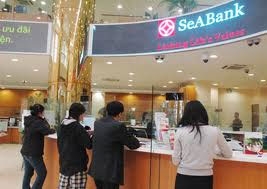Rate race distorts banking system
 |
| illustration photo |
Last week, Southeast Asia Commercial Bank (SeaBank) shot up its non-term deposit interest rate to 12 per cent, per year, while the maximum interest rate is capped at 14 per cent, per year. Other banks like VP Bank have already lifted non-term deposit rates to 9 per cent, per year.
Notably for a long time until mid-March, non-term deposit interest rates were maintained at 3-4 per cent per year.
Nguyen Dai Lai, vice head of Credit Information Centre, said: “If banks en masse offer non-term deposit rates at around 10 per cent per year, who would want term-deposits?”
“This would push up the portion of non-term deposits in their balance. In theory, the interest rate for a longer-term deposit should be higher than short-term [ones]. But for all one, 12 or 24-month deposits, rates are similar at 14 per cent, per year,” said Lai.
At the moment, local banks are allowed to set interest rate no higher than 14 per cent, per year.
Things have changed since March 10 with Circular 04/2011/TT-NHNN, the State Bank requested local lenders applying the lowest non-term interest rate to depositors withdrawing their money prior due date.
For instance, for a three-month deposit a customer can enjoy 14 per cent, per year interest return after three months. But, in case a customer withdraws its money after one month, the applicable interest rate would be non-term deposit around 4-5 per cent, per year. A Vietcombank source admitted that for a long time, almost all lenders have been “cooking” deposits documents to enjoy lower reserve requirements.
The reserve requirement is a proportion of deposits that banks are not allowed to lend to protect the banking system. Currently, the 3 per cent reserve requirement for over a 12-month deposit means lenders have to give the central bank $3 for each $100 mobilised.
On the other side, banking system liquidity is still in question. Last week, the interbank market lending stayed high at around 20 per cent per year for one-month terms.
“The high interbank market rate signals a massive demand of funds in the system,” said a Bank for Foreign Trade of Vietnam executive.
According to HSBC economist Sherman Chan, in 2011 the interest rate was expected to stay high as the sharp acceleration in inflation observed in recent months was likely to continue at least in the second quarter following latest fuel price hike.
In fact, having already raised electricity prices by 15 per cent and fuel prices by up to 24 per cent in February, policymakers announced another round of double-digit upward adjustments to fuel prices last week with petrol prices up by 10.36 per cent, diesel by 15.3 per cent and retail fuel oil by 13.5 per cent.
Headline consumer price index growth accelerated to 13.9 per cent year-on-year in March from 12.3 per cent in the previous month.
What the stars mean:
★ Poor ★ ★ Promising ★★★ Good ★★★★ Very good ★★★★★ Exceptional
Related Contents
Latest News
More News
- Cashless payments hit 28 times GDP in 2025 (February 04, 2026 | 18:09)
- SSIAM and DBJ launch Japan Vietnam Capital Fund (February 04, 2026 | 15:57)
- Banks target stronger profits, credit growth in 2026 (February 04, 2026 | 15:43)
- Vietnam on path to investment-grade rating (February 03, 2026 | 13:07)
- Consumer finance sector posts sharp profit growth (February 03, 2026 | 13:05)
- Insurance market building the next chapter of protection (February 02, 2026 | 11:16)
- NAB Innovation Centre underscores Vietnam’s appeal for tech investment (January 30, 2026 | 11:16)
- Vietnam strengthens public debt management with World Bank and IMF (January 30, 2026 | 11:00)
- Corporate bond market poised for stronger growth cycle (January 28, 2026 | 17:13)
- Vietnam's IPO market on recovery trajectory (January 28, 2026 | 17:04)

 Tag:
Tag:




















 Mobile Version
Mobile Version